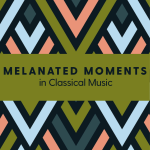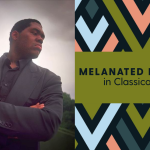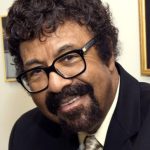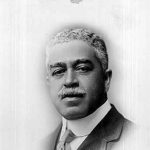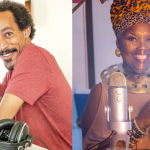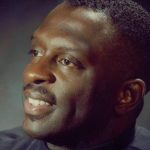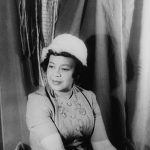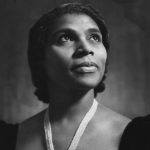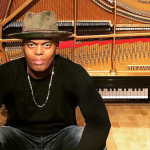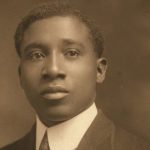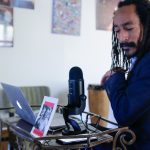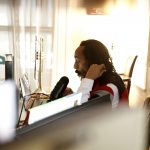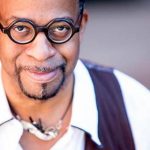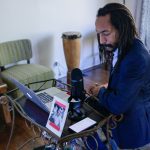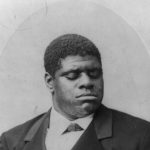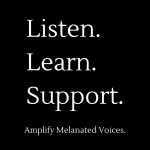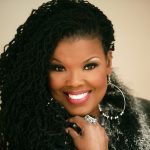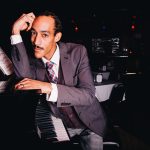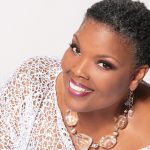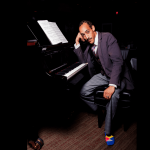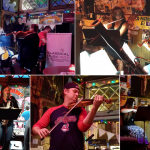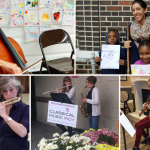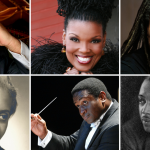MMCM S4E7: Reaching Beyond Reggae with Dr. Mikhail Johnson
Joshua introduces us to pianist and composer Dr. Mikhail Johnson. Born and raised in Jamaica, Dr. Johnson traces his musical influences from the region’s choral composers to his foray into instrumental and 21st-century composition. Angela and Joshua listen to three contrasting works as Dr. Johnson provides compelling insights into the origins of their inception. Relying heavily on the lineage and language of an island and a people who continue to impact nearly every aspect of global and musical culture, his imaginative compositions inspire discovery and accessibility to transform the constructs of the classical canon.
Featured Music:
“Xamaica Fanfare,” by Dr. Mikhail Johnson
“Dutty Tough,” performed by vocalist Autumn Cochran Jordan, and pianist and composer Dr. Mikhail Johnson
“Wach ya HAYDN,” performed by Benjamin Crook
Angela Brown (00:00): Before we get started with this episode, we wanted to thank our listeners for your amazing support of this podcast. We can’t wait to bring you future episodes, but we need your support. Just go to give butter.com/melanatedmoments to help share more stories of exceptional Black artists with thousands of listeners across the US and around the world. Joshua Thompson (00:27): And if you’d like more information on each episode, go to our website or follow us on social media. Angela Brown (00:33): Follow my foundation on facebook@morningbrown or on the web at morningbrown.org. Joshua Thompson (00:41): And follow me, Joshua Thompson, on Instagram @SockJoplin. Joshua Thompson (01:01): Hello, hello everyone, and welcome back to another episode of Melanated Moments in Classical Music. I’m your co-host, Joshua Thompson. Angela Brown (01:10): And I’m Angela Brown. Joshua? Joshua Thompson (01:13): Yes. Angela Brown (01:13): Here we are, recording this fabulous podcast and I don’t know about you, but around this time of year, I’m always dreaming of warm weather, bright sunshine, sand between my toes, and the sound of the ocean in my ear. Joshua Thompson (01:28): I am right there with you. Don’t get me wrong. Indy is cool enough. Angela Brown (01:32): Yeah, it’s real cool right now. Joshua Thompson (01:35): Listen, real cool. Because at this time of year, it also finds me wishing I were somewhere on a tropical island. Fortunately, we’re gonna take a trip today to said tropical island and you don’t even need your passport. Angela Brown (01:49): Nuh uh, I got my bags packed. I’m that- I got my bags packed everything! Joshua Thompson (01:53): [Laughter] Angela Brown (01:55): Where’s the music gonna take us today, Mr. Joshua? Joshua Thompson (01:58): Well, with the help of our very special guest, we’re going to a place that is known world over for tourism, topnotch cuisine, and a style of music known as Reggae that has quite literally come to define the island nation. Angela Brown (02:12): Wait a minute. This is classical music… Joshua Thompson (02:15): [Laughter] Angela Brown (02:15): And we gon’ talk about some reggae? Oh baby. Yes, Jamaica, let’s do this. I could use a little island vibe today. Joshua Thompson (02:23): Indeed, and couldn’t we all. And so we’re all going to be discussing all things Jamaica this week and to help us do that. We’ll be talking to a young man who is quickly becoming one of the most sought after and commissioned composers, who happens to hail from Jamaica and credits a lot of his creative inspiration from the unsung yet incredibly dynamic, Jamaican choral and classical composers. Angela Brown (02:49): Alright now. Well, can we meet him? Come on! Joshua Thompson (02:52): [Laughter] Yes. In a minute, because you know me, I always insist on providing a little background in social context before diving right in [laughter] into the music and this episode will be no different. Angela Brown (03:03): Boy. Would you just come on? I mean, don’t take too much time, baby. We trying to feel and hear the sounds of Jamaica. Not you! Joshua Thompson (03:10): I get it. I get it. Okay. I’ll make it quick…Ish. Angela Brown (03:13): [Laughter] Joshua Thompson (03:13): I’ve got to be, uh, ish, because I’ve gotta, I’ve gotta be a hundred percent honest outside of references to reggae and pristine beaches and honestly like the assumed misconceptions most Westerners have of Jamaica, I really don’t know as much as I probably should about the country and, and how it is still so globally significant. Angela Brown (03:35): Okay. Um, kind of in the same boat with you, Joshua, so please enlighten us. Joshua Thompson (03:41): Okay. I, again, I promise I’ll try to make it quick. Unison (03:43): [Laughter] Joshua Thompson (03:45): Um, and, and, and our guest will be able to fill in blanks and correct where maybe I get it wrong. So just a brief overview about the island of Jamaica. It was originally inhabited by the indigenous, uh, Tainos peoples. And it was under Spanish occupation, um, not too after the arrival of Christopher Columbus in 1494. During this time it’s colonialism, right? So we know what’s going on. It’s enslavement, it’s disease. It’s, you know. Angela Brown (04:10): Mhmm. Joshua Thompson (04:10): All that type of stuff. And so the folks who are on this island originally and African slaves become laborers and a few centuries later in a about 1655, England gains control of the island. And it becomes one of the, the biggest places for the triangular trade. So, we don’t really see anything other than colonialism until until much later. And it’s the British who actually abolished the slave trade in 1807, but not the institution itself. And so this is why you continue to have this continuum perpetual… Perverted trade system between Britain and Europe, between the west Indies and North and, and South America, as we know. So a lot of the people who consider themselves to be Jamaican are, are mostly from Sub-Saharan African ancestry. However, there’s so much more that’s going on in there too. Like a lot of them have Asian ancestry, primarily Chinese and Indian and Lebanese and other mixed races. So it really is this like really nice hodgepodge and pot that is there. And for that reason, it’s very multicultural. There’s, uh, quite a few different languages that are spoken there. And the small nation has such a huge global presence. And we see that in the food and in the music from reggae to ska, to rocksteady, to, to dub and all that other type of stuff. It is quite the vibrant and with-it little island, for sure. Angela Brown (05:40): Okay. Well, you know, you always come with the history, Mr. Joshua, and we haven’t even met our guest yet, but! I thank you for it because I wonder how many folks are aware of the history of the island and how it’s cultural, economic, and geographical position has helped shape the entire world. Joshua Thompson (05:59): Exactly. And to help us fit this whole social, historical, and musical puzzle together. I wanna take the opportunity to welcome the guest of our show. Angela Brown (06:07): Finally! Joshua Thompson (06:09): Girl, please. Angela Brown (06:11): Oh, I’m sorry. Unison (06:11): [Laughter] Joshua Thompson (06:11): So he’s a gentleman who is just a phenomenal representation of Jamaican influence in classical music for the 21st century. So please, without further ado- Angela Brown (06:21): Yes! [Laughter] Joshua Thompson (06:22): Help me welcome, Dr. Mikhail Johnson. Welcome to Melanated Moments in Classical Music. [Laughter] Angela Brown (06:29): Welcome, doctor, welcome! Dr. Mikhail Johnson (06:32): Joshua and Angela, Wah Gwaan! [Laughter] Jamaican and everything, yes. Joshua Thompson (06:39): Yes, say it again. “Jamaica and everything.” Yes! Dr. Mikhail Johnson (06:42): [Unintelligible] Jamaica, everything. [Laughter] Joshua Thompson (06:43): So excited to have you. Dr. Mikhail Johnson (06:45): Yes, I’m so glad to be here. Thank you so much for having me, such an honor. Angela Brown (06:49): We are very happy to have you. Joshua Thompson (06:51): So let’s kind of just kind of get right into all of it. Uh, now Angela, I actually had a wonderful opportunity to meet Dr. Johnson back in October of last year, I was doing a residency with the university of Puget Sound’s, uh, School of Music in Tacoma, Washington, and met this fantastic and brilliant young man who has a million watt smile that just lights up a room and we became- Angela Brown (07:14): Oh, I wish I could see it. Joshua Thompson (07:15): Yes. We became fast friends and just, uh, I started learning and, and reviewing his music and was just like, ah, okay, we gotta get him on the show, got to get him on the show. And here he is. So Dr. Johnson, tell us how this all starts. How- what was your introduction into music? And, you know, what’s been the trajectory of this incredible career that you’ve got going? Dr. Mikhail Johnson (07:37): Okay. It’s, it’s, it’s really a long story, but I tried to make it short. Um, it started when I was four years old, my mom actually was the one who discovered me, uh, liking music because she would normally have the TV on that would have a program on a specific time on Sunday afternoon. And she’d be busy cleaning the house and preparing it for the week. And, uh, this week she was just not in the mood for any classical music. She’s like, nah, uh, we need something else. And she changed the channel and I started to cry. Angela Brown (08:08): [Laughter]. Dr. Mikhail Johnson (08:08): Unbeknownst to her, she, she thought it was a fluke. And she was wondering, you know, if this really was a thing, so she kind of tested it a little bit and she realized that this was really true. And so she eventually took piano lessons tohave me around the instrument. And so by the time I was age six, I think I got my first keyboard. And by 10, I was playing for churches because I was learning by ear. At that time, I was just listening and kind of figuring things out that was from the church services, you know, they were playing the, the hymns and, and so on, actually figure things out by ear. So things progressed. Um, I, I eventually liked classical music a lot, but I was trying to learn the stuff by ear. And I was like, you know what, I’m getting tired. I’m trying to figure out how could I learn to, to read music? And it, eventually I put my science brain to work because I was a science nerd. Angela Brown (08:55): Ah. Joshua Thompson (08:55): And, um, and kind of found a way around it. Um, while I took piano, um, not piano lessons. So I took music classes in school, but I was learning one staff, which was a treble staff, which was recorder. Angela Brown (09:06): Uh-huh. Dr. Mikhail Johnson (09:07): So you’re just like, okay, if this is how you learn treble- Angela Brown (09:10): We have another blerd here… Joshua Thompson (09:11): [Laughter] Dr. Mikhail Johnson (09:11): Right. So if you, so if you do learn treble here, how do you, you learn bass? And, you know, that’s how I kind of like put the pieces together. But as it morphed, this aspect of when I got to high school and we were doing these SAT equivalent exams for music, there was a requirement that asked us to compose three contrasting pieces. And that was almost like my foray into, into composition. But I, I thought, I thought maybe prior to that, because I was improvising a lot, I never saw the relationship between the two. It was just a matter of me knowing how to write down the things rather than me just conjuring these ideas in my head prior. So I never made the relationship before, in terms of me improvising, learning stuff by air and being able to write this stuff down. So I never really thought of composing as a, as a full-time thing. I was just like, let me just meet the requirements and, and keep it pushing. Um, but it was not until I got to college when my mentor, uh, Andrew Marshall, because I actually went there specifically for the music, but I was, I was still a science major then, but he took me under his wing and he was an amazing choral arranger and composer. And, you know, he was the one who transformed my thought of actually becoming a composer, because I took some lessons with him. And uh, there was this one project when he said, you know, I wanted to create a patriotic song and I created the Anthem of Independence and he was like, oh, I really like what you’ve done. Um, if you could tweak this here and this here, we would like to actually premiere it. And that was my first opened-eye experience as to, oh my God, I’m actually getting a piece performed. I’m actually think- being thought of as being a composer, I’m, you know, this and that. So, you know, it was quite a, a journey there and I never looked back since, and I was mostly a choral composer, uh, that time until I got to Bowling Green 14. And I said, you know, if I wanted to do music in terms of like a comp- composition, I wanted to go on the far end of the spectrum, meaning that I wanted to go into like- Angela Brown (11:17): Okay. Dr. Mikhail Johnson (11:17): The, the very dissonant, just because I was very much entrenched into the, the consonant world while I was in Jamaica. Um, I was like, I would want the bo- you know, the end of the spectrum to kind of mix the two. Angela Brown (11:29): I want to read what I found as your artist statement. Joshua Thompson (11:34): Ooh, yeah. Angela Brown (11:34): And as a pianist and composer, you said: “I seek to create a conduit that allows classical concert music to be more inviting to a public who believes this music is not meant for them. If classical music is to be equitable, I must be intentional in my role through my contribution. I hope these diasporic and luminous works will assist in dismantling the construct of the canon and instill a tradition of discovery through programming. As a composer, my work merges the realms of tonality and atonality with the implementation of extended techniques to enhance my artistic narrative, which is firmly rooted in rhythms, drumming, and folk songs of my native Jamaica.” So you just told us that one of your first pieces was now I’m gonna mispronounce this… Joshua Thompson (12:39): [Laughter]. Angela Brown (12:41): Xamaica? Is that right? Dr. Mikhail Johnson (12:43): Well, actually this was, uh, this was, um, I would say quite like my, my third or fourth piece. So this was like- Angela Brown (12:51): Oh. Dr. Mikhail Johnson (12:51): Much later, this was much later. This was my, almost my introduction into instrumental works. Angela Brown (12:58): Oh! Dr. Mikhail Johnson (12:58): So this was, this was me like branching out into like, okay, I’m done with- not necessarily done with choral, but I wanted to really now enter into the realm of instruments now that I was at school. Um, and had the resources to write for instruments, ’cause I knew that they were gonna be played eventually. So, um, this was when I was at Texas Tech, um, University in 2017 and I was just like, well the pandemic hit during 2020. So this was very recent, a very recent composition. Joshua Thompson (13:27): Let’s take a listen to it. I think this is a, a perfect setup for that. And we can come back and talk about that, that pull and that at cultural root influence from Jamaica, but I will probably mis- mis- mispronounce it as well, but this is your Xamaica Fanfare. So let’s, let’s take a listen. Music Plays (13:45): [Dr. Mikhail Johnson’s “Xamaica Fanfare”] Joshua Thompson (16:14): Oh man. Bravo, bravo. Yeah, Angela, your thoughts? Dr. Mikhail Johnson (16:18): Thank you so much. Joshua Thompson (16:19): Yes! Angela Brown (16:20): I mean it was very bombastic, it was, I mean, you felt like you was going somewhere with that. It was like, come on chil’ren, let’s march on! Let’s be, you know, strong. Dr. Mikhail Johnson (16:29): Absolutely. And as you could tell, as you could tell that was a very new style for me in the sense that, um, compared to when I was exclusively a choral composer from, you know, 2005, 20- up to 2010, 2014, uh, I was exclusively choral music. And so me entering into the realm of instrumental works, you would’ve heard a, to totally different musical language. And so I’m very happy to kind of hear this in this context. Um, it’s been a while since I’ve heard this piece, so it’s, um, it’s nice to kind of hear it in this, in this context to just talk about my transition into writing for instruments. Joshua Thompson (17:07): Yeah. And it’s, it, it really is. It gives you all that- Dr. Mikhail Johnson (17:10): And I think it’s a great introduction to the podcast. Joshua Thompson (17:12): Yeah, I agree with you. It, it gives this really again, its that pomp and circumstance that is absolutely owed to commemorate, you know, Jamaican independence day from British rule in 1962. You, you mentioned something about composition being a language and it’s not something that I’m very familiar with, but there is such a nuance in such a distinct set of languages amongst the Jamaican people. And there’s, and there is a piece that we’re gonna get to here in a second, I know you’re excited to talk about. But briefly Dr. Johnson, can you, can you tell us a little bit about what that distinct dialect in Jamaica is, if I believe it’s Patois. And how language is really a huge influence on you and how you construct, create, and compose your pieces. Dr. Mikhail Johnson (17:58): Okay. So when it comes down to Jamaican Patois, which, you know, is an amalgamation of a lot of things, uh, which is deeply rooted in English to an extent, but it infuses a lot of languages, such as Portuguese, Spanish, a lot of the African languages and nuances. And so there’s Dutch, French. There are so many of them that’s infused in it. And surprisingly, we talk about this idea of, of language being the root of that. When for so long, we’ve been taught that this is bad speaking, and if we’re not speaking the Queens English, then it’s not a proper thing. And we’ve just gotten a chance to come around and really accept the language for what it is, which is our identity. And so when I talk in my, uh, artistic statement about music being equitable and me using my language, for me, it’s not a matter of just trying to do something that’s novel, for me, it’s about preservation for me, it’s about perpetuation of a cultural heritage, which could otherwise be lost if we do not find a way to catalog and make it concrete in form- in some form of writing. And if we look around in the classical realm, uh, when we talk about this idea of equitability, people have music that they can identify with: Bach with German, Debussy with French, um, Rachmaninoff et al with, you know, Russia. They’re speaking and they’re writing in the language that, that, you know, translates to their audience. And so with that being said, you’ll start to realize that the language that they speak in and of itself is very rhythmic and that’s what informs their rhythmic sensibilities. So they’re able to identify with that as well. So why not translate that for Jamaicans as well, so that they have something to identify with. Angela Brown (19:49): That’s right. Dr. Mikhail Johnson (19:50): And I realize they, they have not gravitated towards classical music more so because they would want to sit down and listen to Bach and Mozart and Beethoven when they have no identity with that kind of musical language or with that kind of person or with that kind of culture. And yet, um, I’ve really been grateful to have comments of, you know, when people say, you know, I don’t listen to classical music like that, but I definitely listen to this and it’s because they’re hearing themselves being represented. Angela Brown (20:18): Mhmm, mhmm. Joshua Thompson (20:18): Right. Dr. Mikhail Johnson (20:19): And so through that, they’ll be willing to sit and listen to the Bach and the Debussy eventually because they know that they have something for themselves. Angela Brown (20:27): Exactly. Exactly. Well, this sounds like a good opportunity to listen to an example of language and dialect as a central focus of one of your pieces, Dutty Tough. Dr. Johnson, before we listen, can you tell us a little bit about this piece? Dr. Mikhail Johnson (20:44): Okay. So this piece is, uh, Dutty Tough. Uh, it’s coming from a song cycle called Jamaican Plight, which speaks about the onset of immigration from Jamaica to the United States or to England at the time, um, of the fifties and sixties. And this was- the text is from a prominent Jamaican poet who I dearly admire and you know, God rest her soul. Her name is Louise Bennett-Coverley, and she was one of the premier folklorists and you know, broadcasters and poets of our time. And she was the one of the first persons to actually write poetry or any literature in the Jamaican dialect. And this gave a clear picture internationally as to what Jamaica was like. Uh, so vividly in the fifties and sixties. And so Dutty Tough is basically speaking about economic hardship because the- it’s it’s from a proverb, which says “Rain a fall but dutty tough.” The rain is falling, but the earth is still hard. And so it’s almost like this idea of you’re trying to penetrate this ground, but it’s, it’s like as soon as the, the rain drizzles on the earth, it still gets absorbed like nothing happened. And so we’re going through this, you know, time when you’re hearing someone kind of like ranting about the, the stress that you’re going through, the, the, um, the turmoil of just trying to survive and make ends meet. So it says, uh, “Sun a shine, but things not bright; Doah pot a bwile, bickle no nuff; River flood but water scarce; Rain a fall but dutty tough,” which means the sun is shining, but things aren’t bright. Though, food is on the pot boiling, it’s not enough. The river floods, but water is scarce. The rain falls, but the dirt is still tough. Hope you enjoy. Music Plays (22:27): [Dr. Mikhail Johnson’s “Dutty Tough” performed by Autumn Cochran Jordan (Voice) and Dr. Mikhail Johnson (piano)] Joshua Thompson (25:49): This is, you know, Dr. Johnson, this is, I, I really like this. And I appreciate the background that you’ve given us on this, because what you compose is… A brilliant set of tension with almost no release that perfectly mirrors, this, uh, that folk adage that you were talking about, you know, with, with Dutty Tough. It’s, uh, it made it a whole lot- I don’t wanna say easier, but I understood the proverb. It made sense. And I understood why that tension was there without that release. This was, this was, this was incredible. Dr. Mikhail Johnson (26:20): Yeah, thank you so much. And the idea of me using inside of the piano to evoke this, it’s almost a visual as much as it was an aural effect in the sense that I’m literally hitting the strings as a metaphorical example of me hitting the ground. And the sound is like the dust that comes up from the air, like you’re trying to break through and it’s just no form of getting beyond. Joshua Thompson (26:46): Yeah. And, and you’re actually plucking the inside- I was wondering about that. Are you, are, are you plucking the insides of the, of the strings? Dr. Mikhail Johnson (26:51): Yes. I was plucking the strings as well. Joshua Thompson (26:53): Wow. Dr. Mikhail Johnson (26:53): Yes. And that was, and those are like the instances of when you, you feel break through is in sight, but then it’s shortlived. Joshua Thompson (27:01): Or as we say, America, uh, “traveling without moving” or “running around in circles.” Right? That’s, that’s a, that’s wonderful, wonderful, wonderful. Um, I think we have one more Auntie Angela, if you- Angela Brown (27:13): Yeah, yeah. Before we sign off, can you set up the back story behind another of your pieces called Wach ya HAYDN? Dr. Mikhail Johnson (27:24): Wach ya HAYDN was um, a fabulous commission by Bowling Green State University, my alma mater, and, um, my dear friend Abigail wanted me to write a piece that was a way of introducing young, um, pre-college students, uh, or early collegiate students into contemporary music. And one way to do that was to find similarities between the classical music that they’ve known for so long in the repertoire and find techniques that are similar to that in, and put that in the modern context. So Haydn being, you know, one of the greatest composers in the classical era. Um, I just took a fragment of that and said, what would Haydn do? And I just decided to rely on, you know, the humor of Haydn and the patterns in that and, and create not only this kind of parody of like Mozart towards Salieri, you know, because, you know, Mozart and Salieri had, this little, you know, riff, for me to say, uh, Hey, Haydn, look what I can do. So Wach ya HAYDN is like saying, look here, Haydn, watch here, Haydn, look what I can do. And also, it also means what are you hiding? Which is the journey of hide and seek. So these, these ideas kind of return as though you’re kind of going through this maze of looking for something. And then eventually I put the quote of Haydn, which the whole piece is based on, at the end, which shows you that eventually when you find this object that you’re looking for, the, the euphoria eventually just dissipates, you know, after all this tension really quickly. Joshua Thompson (28:53): And I gotta say, it’s a fun, it’s eclectic and a little quirky and innovative piece in my opinion, but it’s, it’s, it’s stunning. So let’s, let’s take a quick listen. Music Plays (29:00): [Dr. Mikhail Johnson’s “Wach ya HAYDN?” performed by Benjamin Crook] Angela Brown (33:44): Now that was an incredible piece! I mean, it was all over the place, but in a good way. I can imagine it tastin’ like a good Jamaican stew. Joshua Thompson (33:54): [Laughter] So true! Like there’s so much virtuosity, like complexity in the modern stylings, but, uh, never far removed from that very structured compositional style of, of Haydn. And so I think the piece is fantastic. Dr. Johnson… Dr. Mikhail Johnson (34:09): Thank you so much. Joshua Thompson (34:10): Insane, insane levels of composition here, and it’s been absolutely exciting and, and truly inspiring to have you, uh, on our show today. Angela Brown (34:20): Yes, yes. You gave us sights, sounds, and the soul of the Jamaican island, and graciously provided your unique perspective on classical music and increasing equity and accessibility in the genre. We certainly say thank you for expanding our horizons today. Dr. Mikhail Johnson (34:40): I think you and I, and I do hope that, um, you know, this is a horizon that I, I, I feel other composers, um, that hear me would be able to, to delve into and, and, and enjoy. And also for people in the- on the island, um, would also be inspired by my work and, and would seek to pursue music and, and composition in perpetuating this cultural heritage as well. Joshua Thompson (35:04): Absolutely. And hopefully today’s episode has effectively and inspirationally filled everyone with that island vibe. So until next time, I’m Joshua Thompson. Angela Brown (35:18): And I’m Angela Brown. Joshua Thompson (35:22): And this has been Melanated Moments in Classical Music. Angela Brown (35:32): Melanated Moments in Classical Music is a production of Classical Music Indy. Our producers are Ezra Bakker, Trupiano and Adam Fonacier. Our theme music was composed by Laura Karpman. Joshua Thompson (35:47): Melanated Moments in Classical Music is made possible in part by the Indiana Arts Commission, a state agency, and the National Endowment for the Arts, a federal agency. Additional support comes from the Indy Arts Council and the City of Indianapolis. Angela Brown (36:02): Our podcast partners are Morning Brown, Inc. and Symphony Tacoma.
[/su_tab] [su_tab title=”Related Blog Posts” disabled=”no” anchor=”” url=”” target=”blank” class=””]LOCAL CLASSICAL – MELANATED MOMENTS SEASON SIX
As we continue celebrating Black Music Month, this week’s playlist will feature music and artists discussed during the latest season of Melanated Moments in Classical Music. All of season six was recently released and featured vibrant discussions about artists such as Scott Joplin, Hazel Scott, Joseph Bologne, and Kenneth Overton, among others.
LOCAL CLASSICAL – BLACK MUSIC MONTH
In this week’s playlist, we celebrate Black Music Month which takes place in June. It was created by President Jimmy Carter in 1979 to honor and celebrate Black artists’ contributions to music. We’ll be honoring the late Herman Whitfield III, an Indianapolis native who was a gifted pianist and composer. We’ll also hear performances of artists who have been featured in season four of Classical Music Indy’s podcast, Melanated Moments in Classical Music.
LOCAL CLASSICAL – MELANATED MOMENTS
In this week’s Black History Month playlist, we bring you recordings by composers, performers, and artists who have been highlighted in our podcast, Melanated Moments in Classical Music. Melanated Moments is the ward-winning podcast from Classical Music Indy that shines a spotlight on musical works composed by, for, and about Black people.
Ric’key Pageot: Inspiring a Moment to Learn, Acknowledge, and Respect
Ric’key Pageot: Inspiring a Mo …
Ignatius Sancho: Composing the Hypocrisy of Colonialism & Convention
Ignatius Sancho: Composing the …
NEW CLASSICAL – DR. BILL BANFIELD
This week we bring you the music of Dr. Bill Banfield. Dr. Banfield is an award-winning composer whose symphonies, operas, chamber works have been performed and recorded by major symphonies across the country. Few have a wider, performed professional composing output, that has had public concert performances, reviews, radio, recordings of some 12 symphonies, 7 opera, 9 concerti, chamber, jazz, and popular forms. This alone making Dr. Banfield one of the most performed, recorded composers of his generation. In 2010 and 2016, Dr. Banfield served as a Pulitzer Prize judge in American music.
#AmplifyMelanatedVoices
Classical Music Indy stands with our Black community. We are here to listen, learn, and lend our support. We believe that classical music is powerful; that it evokes a range of human emotions and creative expression.
Angela Brown Brings her Unbridled Zeal to a New Podcast.
Angela Brown brings her unbrid …
Local Classical – Angela Brown
We continue our Black History Month programming this week with our featured artist, soprano Angela Brown. Born in Indianapolis, Brown has led a world-renowned career as a vocal soloist. Her highly successful Metropolitan Opera debut in the title role of Aida captured instant attention from international print and broadcast media and catapulted Angela onto the world’s prestigious opera and symphonic stages.
Highlighting our Female Performers
Classical Music Indy employs a diverse range of musicians for our events around Indianapolis. In 2016 we hired 95 musicians. Classical Music Indy has dedicated our blog articles to outstanding women musicians this month. We’ve shared about great women music educators in America and about under-recognized women musicians throughout history. This week, we take a look at a few of Classical Music Indy’s top performers – women who are doing great work here and now in the city of Indianapolis. Read below about these incredibly talented musicians, and hopefully you’ll hear them at one of our events in the near future!

